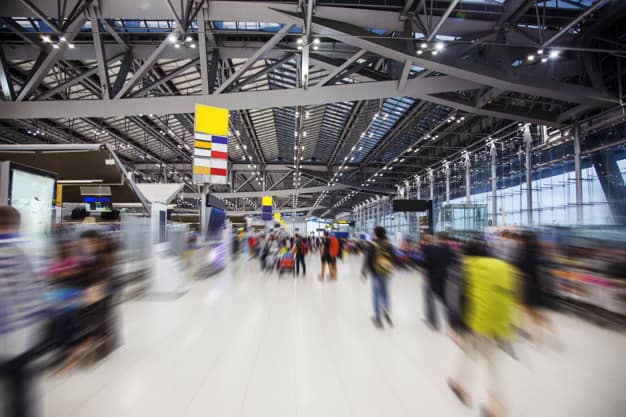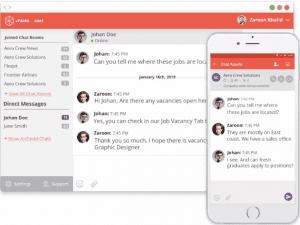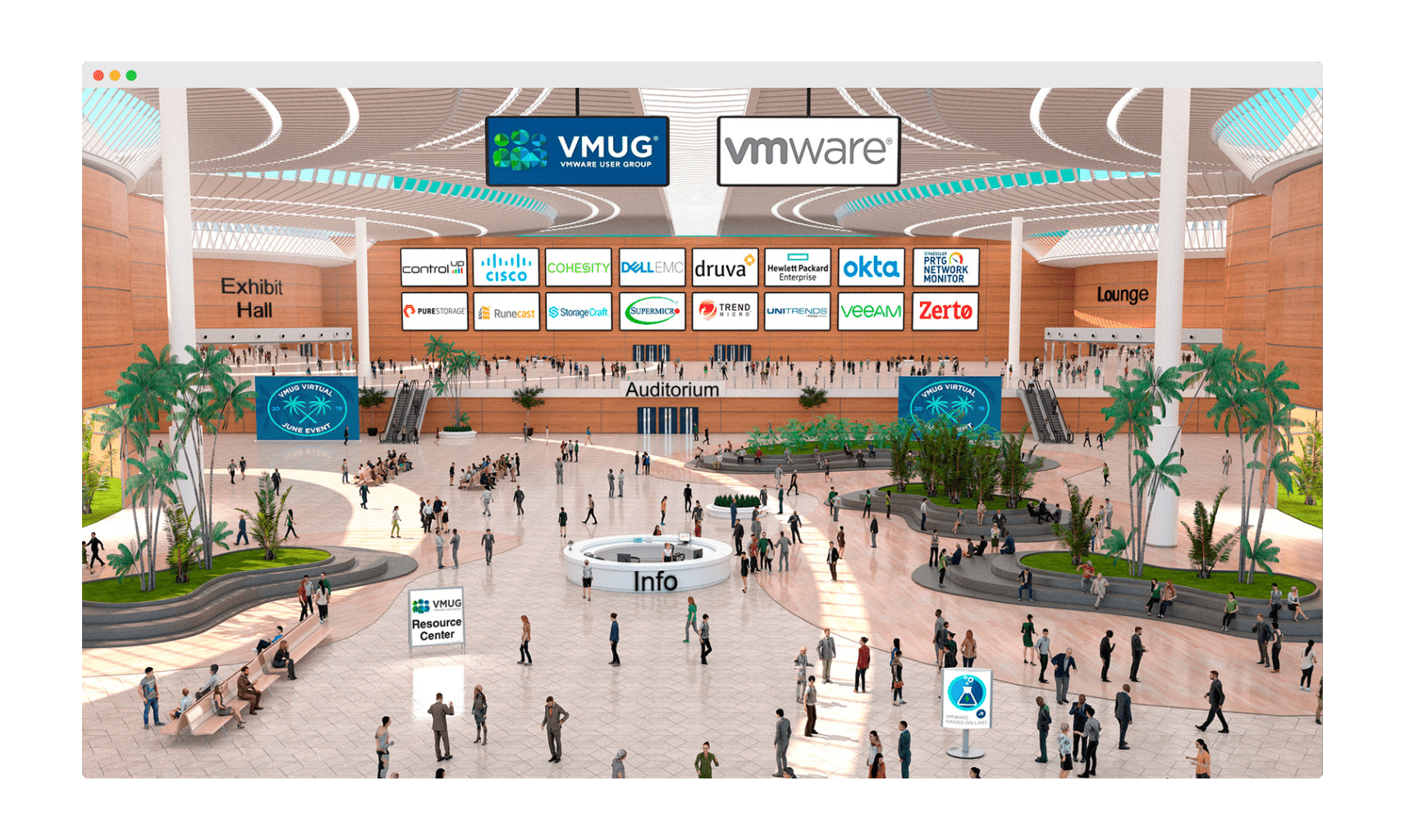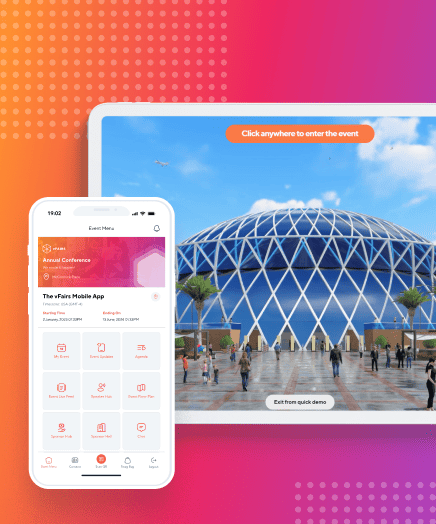 As the count of event cancellations grow due to the COVID-19 crisis, organizations are being challenged to react quickly to ensure business continuity. If you were planning to attend an event or organize one in the United States, Europe or South Asia, chances are that they have already been called off. Needless to say, this represents a massive financial impact and a dent in the growth plans of every company. The tech industry alone is reported to suffer more than a billion dollars due to the abrupt change of plans. While these times are challenging, luckily, there is a silver lining that companies can consider with regards to cancelled events: virtual events. We, at vFairs, are already seeing massive interest from organizations planning to move their conference, career fair or exhibition to an online setting to mitigate their losses and keep audiences & stakeholders engaged.
As the count of event cancellations grow due to the COVID-19 crisis, organizations are being challenged to react quickly to ensure business continuity. If you were planning to attend an event or organize one in the United States, Europe or South Asia, chances are that they have already been called off. Needless to say, this represents a massive financial impact and a dent in the growth plans of every company. The tech industry alone is reported to suffer more than a billion dollars due to the abrupt change of plans. While these times are challenging, luckily, there is a silver lining that companies can consider with regards to cancelled events: virtual events. We, at vFairs, are already seeing massive interest from organizations planning to move their conference, career fair or exhibition to an online setting to mitigate their losses and keep audiences & stakeholders engaged.
But first, what really is a Virtual Event?
A virtual event is an online destination that helps you connect audiences globally around topics of interest. Much like seminar rooms and exhibition halls, virtual events facilitate networking through virtual booths, live webinars and chatrooms to simulate the experience observed in physical events. A platform like vFairs is additionally able to offer deeper experiences for certain types of events like job boards for recruitment fairs and e-commerce plays for trade shows. 
How can an online event replace a physical one?
If you’re still evaluating how an online event can deliver the value you were expecting from your conference or trade show, here are a few reasons you should consider:
1. It’s Cost-Effective
A physical event can be extensive when it comes to monetary investments. For example, it requires manpower and funds for activities like:
- booking a venue with the appropriate capacity
- providing hospitality
- acquiring marketing collateral & setting up booth
- parking & valet facilities
- travel & accommodation cost of key speakers/guests, and so on.
A virtual event, on the other hand, allows organizers to spend a fraction of the cost of events requiring physical spaces. Most of the effort is directed towards marketing and awareness, while your virtual event provider takes care of the setup details behind the scenes. 
2. Allows you to reach a global audience
Due to its online nature, a virtual event can maximize the visibility of your event by extending your reach to the entire world, without any space and time constraints. In comparison, physical events are limited in capacity and mostly attract local audiences and those who were able to make the trip. Moreover, a virtual event can be accessed from home, from any device which adds convenience for participants and relieves them off the anxiety of travelling in these troubling times. 
3. Enables networking using familiar tools
A major reason professionals attend conferences is for the opportunity to network. Virtual fairs facilitate this objective through chat tools that are easy to operate and learn. Modern professionals use Skype and Whatsapp all the time in their routines, thus, this mode of interaction comes naturally to them. Granted, it may not resonate the same “personal” experience you get from a face-to-face encounter, however, it is the next best alternative. The vFairs platform provides the opportunity to network in a group (using group chatrooms) and also jump into private conversations through 1:1 text, audio and video chat. 
4. Delivers similar experiences to Physical Events
Unlike webinar-only platforms, virtual events aim to recreate a lot of the value you expect of physical fairs. For example, instead of paper-based brochures, vFairs allows attendees to review videos, documents and presentations and save them to their “virtual briefcase”. Similarly, virtual events offer networking through chat tools, guide attendees using a virtual information booth, facilitate speaker sessions through embedded webinars and promote engagement through online gamification and scavenger hunts. All of these experiences are then encapsulated in a 3D visually-rich environment which gives an immersive feel for the audience, hence, bringing the event “alive”. 
5. Helps you measure success
You have an objective in mind before setting up an event. But how will you find out whether you’ve achieved it or not? At a virtual event, measuring the success of your event is quite easy given its digital nature. You can track attendance and engagement metrics in real-time. vFairs, additionally, prepares detailed reports at the end of an online event, so that organizers can effectively comprehend their ROI and assess their performance. To learn about additional reporting features that vFairs offers in real-time, click here. 
6. Promotes inclusivity
An important consideration of any event is how to design it to make it accessible for those with special needs. Event venues make special arrangements like wheel-chair accessibility, hearing aids during talks and using compliant signage.  Similarly, platforms like vFairs bake this into the experience they offer as well. For example, they enable attendees with visual impairments to vary the font size and consume content through text-to-speech add-ons. Learn more about the accessibility features provided by vFairs by clicking here.
Similarly, platforms like vFairs bake this into the experience they offer as well. For example, they enable attendees with visual impairments to vary the font size and consume content through text-to-speech add-ons. Learn more about the accessibility features provided by vFairs by clicking here.
7. Online events are eco-friendly
Here’s where virtual events outpace physical ones. In today’s world, where times are climatically tough for the planet, hosting any physical event results in a huge amount of paper waste, causing a further increase in the carbon footprint. A virtual event, on the other hand, is environmentally friendly. This is why its, at times, the first choice of many responsible organizations and institutions who wish to save the Earth and invest in monetarily, as well as environmentally friendly solutions. 
Conclusion
While it is extremely unfortunate to be experiencing one of the worst pandemics that have ever occurred, it is highly essential to opt for precautionary measures to keep it from affecting more lives than it already has. This involves avoiding the setup of physical spaces that require gathering a number of individuals and exposing them to the devastating risks of Coronavirus. Instead, businesses and institutions can consider online events as a means to offset their losses. If you are one of the affected organizations, here’s a step-by-step guide that will help you through your transition from a physical to a virtual event. For assistance regarding your event, we are available to further facilitate you. Click here to talk to a representative.
ABOUT VFAIRS:
At vFairs.com, we strive to build a top-class online event platform that will help event organizers make memorable connections with their target audience. We’re obsessed with taking out the hassle normally associated with physical events and leaving organizers and exhibitors to focus on what’s most important: engagement with the audience.


